How secure is VoIP? Understanding VoIP Security Risks, Issues & Threats
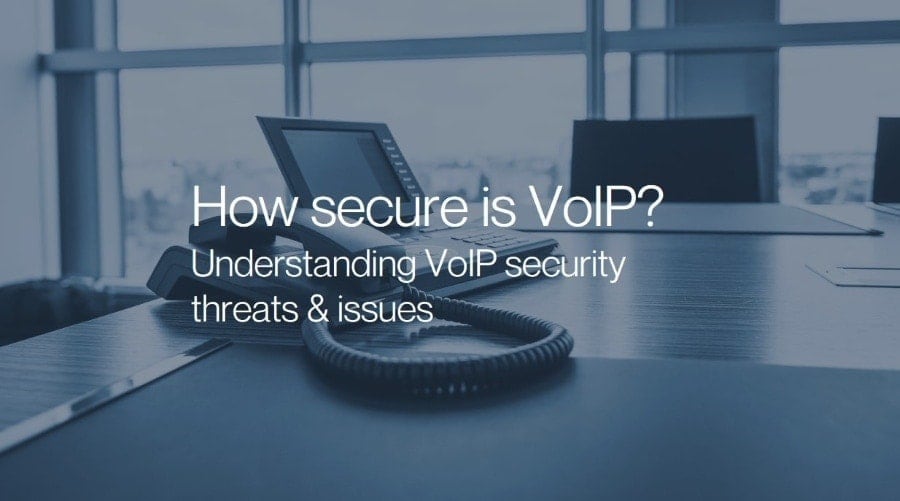
VoIP is an excellent tool for businesses looking for convenient, fast, cost-effective communications. However, as with all technology, specific steps must be taken to ensure VoIP is secure.
Despite all the powerful functionality and cost-saving features, cloud-based communication systems can be exploited by security threats.
Below, we explain common VoIP security risks, issues, and threats and the measures and practices businesses can use to secure their VoIP deployment.
On this page:
Is VoIP Secure?
Every business, small or large, prioritizes security. A disruption to the phone service is not something an organization would want to experience. Low costs associated with VoIP appeal to business owners; however, understanding how to secure VoIP is crucial to ensure organizations maintain and enhance the experience offered by this technology and prevent any unforeseen costs.
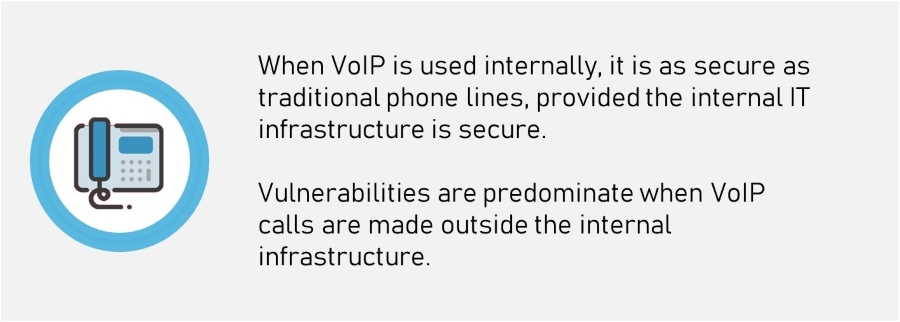
Security of VoIP was not considered so prominent because the traffic was limited to local enterprise and wide-area networks often protected from the public internet and therefore regarded as secure.
As VoIP usage increases for businesses, users can be vulnerable to the same security risks as traditional data networks.
Fortunately, VoIP is considerably more secure today, with service providers employing the best security practices against an ever-evolving range of threats.
Nonetheless, being on the internet, VoIP telephony systems are prone to security threats. If not secure, VoIP service can be exploited or calls intercepted by malicious individuals to the detriment of your organization.
Top VoIP Security Risks, Issues & Threats
The VoIP systems can be vulnerable to a variety of risks from the internet. The most significant risk is that an attack cannot be traced if it occurs.
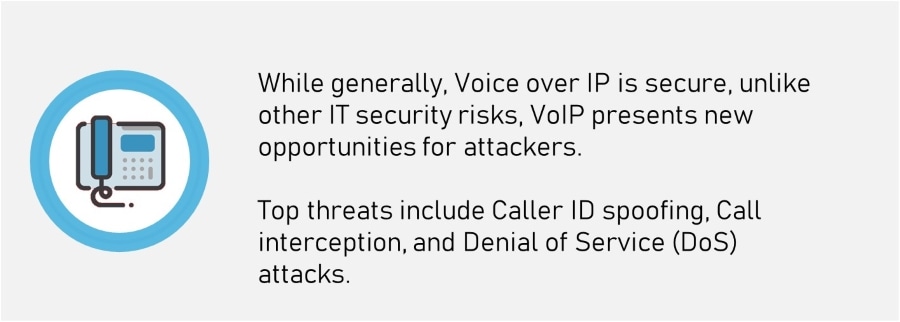
Before we look at the steps needed to make VoIP secure, let’s take a look at some of the present day threats and security issues faced by VoIP systems:
Denial of Service (DoS)
A highly concerning threat to a VoIP network, DoS attacks intend to shut or slow down the network for some time.
Your network is starved of resources to drop calls and interrupt service. A denial-of-service flood may overwhelm the system, or hackers can infect the system with worms and viruses and even make overflow attacks. When faced by a call centre, such attacks can affect uptime, call quality and latency.
Toll Fraud
A common VoIP threat, toll fraud requires access to a network to make calls to premium phone numbers. Attackers often dial international numbers, which can accumulate expensive toll charges.
War Dialling
Such a security attack involves controlling the PBX to scan other networks. War dialling operates by dialling numbers to connect to unprotected devices like modems.
Phishing or Vishing
An emerging VoIP security threat is associated with phishing or ‘vishing’. Vishing is when attackers divert genuine calls to malicious actors who present themselves as a genuine party.
The customer believes the call to be legitimate and may provide financial or personal information. Such attacks target users who trust their caller ID. Preys are often seen revealing details about the network, passwords and other sensitive data.
Spam
Another growing problem in the VoIP environment is spam over voice telephony. Hackers can use the network to send messages to phone numbers, thereby affecting your reputation and consuming your transmission capacity.
Call Interception
One of the most severe threats to VoIP systems is the interception of messages and audio calls. Unencrypted SIP traffic can be easily intercepted over unsecured networks.
A middle-man could be intercepting a VoIP call, and the other person ends up talking to an impersonator instead of the actual business owner. Video calls can also fall victims to this threat.
Malware
Attackers often use different types of malware software to get access to credentials of the phone and email. Such attacks can open up opportunities to intercept the network and steal sensitive information.
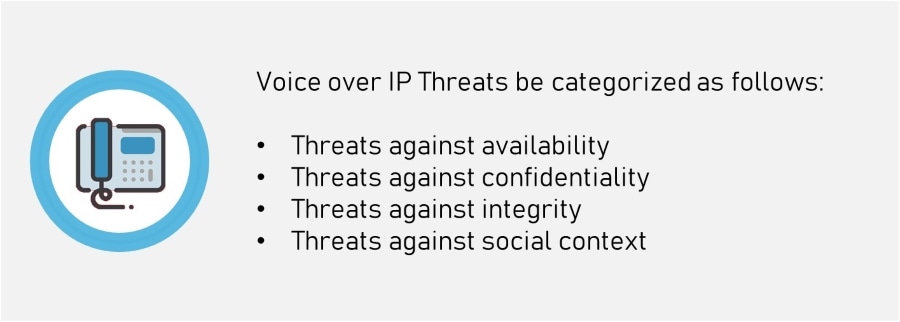
How to secure your VoIP System
Businesses often question the security of VoIP networks, and the risks outlined previously explain some of the critical vulnerabilities faced by a VoIP system.
To protect against these threats, businesses need to take concrete steps to secure their VoIP deployments to ensure safe and secured communications.
Presented below are some of the most effective ways to achieve secure your VoIP:
Encryption
Encrypting data is one of the most effective ways to secure your VoIP network and ensures the information transmitted over the network is unreadable even if intercepted.
Encryption is particularly beneficial if your customers carry out sensitive conversations or transmit information that could hurt their reputation if leaked. Employing encryption at multiple points to make it difficult for hackers is a particularly effective strategy to secure your VoIP systems.
Passwords
Another way to strengthen your VoIP system’s security is to have strong passwords for the routers, switches, firewalls, and servers.
Ensure you follow the security protocol when you set the password so that it is not easy to guess. Also, set a different password for each platform and device to improve the security.
Testing
Consider investing in penetration testing regularly. This type of testing is where IT professionals ethically hack systems to identify vulnerabilities. These tests help determine areas of weakness that can be remediated, contributing to your efforts to secure VoIP.
VPN
A virtual private network is another effective way to secure VoIP data when using internet transmission. This type of solution works like an internal network giving you a private network over which you can send the information with minimum risks.
When you set up VoIP over a private network, your SIP is secured by making the portal secure and untraceable.
Network Address Translation (NAT)
Network Address Translation, or NAT, is a valuable router feature that gives you a private IP address for devices like computers, phones and others on the internet.
With NAT, only the internal LAN can see this IP, thereby making it obscure to an intruder and thereby saving the network from any threats. Conversely, VoIP phones with public IP addresses are more vulnerable to attacks.
Security Best Practices for VoIP
For organizations looking to secure VoIP installations, we’ve simplified the best practices to ensure optimal security for your business phone systems.
- Enforce a strong password policy – Strong passwords are crucial to securing your IP phone systems. Using a combination of alphanumeric and special characters strengthens the password, making it more challenging to identify. Employees must be discouraged from storing or sharing passwords.
- Ensure system updates are applied regularly – Ensuring your systems are maintained with the latest updates is essential to preserving security. If you have a Cloud VoIP service, this would be performed by your cloud phone provider. If you employ any mobile devices that connect to your VoIP network, these must also be kept updated.
- Set up a VPN for remote employees – Any mobile devices connecting remotely to your VoIP must use a VPN. VPNs can encrypt traffic regardless of where the employee is, adding a further layer of security.
- Regularly review your call logs – Your call logs need to be reviewed periodically to identify any unusual calling trends or behavior. Most business phone systems have a call analytics feature to allow call volume to be monitored at weekly and monthly intervals.
- Restrict outbound calls and block private calls – Unless your business trades or deals with international customers or partners, you don’t need to dial international numbers. You can restrict access to international numbers to only those employees who need to call abroad. You can confirm with your VoIP service provider to block international numbers to prevent toll fraud.
- Deactivate inactive accounts – Ensure you have an offboarding process for when employees leave the company. This process should include the deactivation of any phone accounts, including remote access to voicemail and conferencing facilities.
- Educate users on security practices – Security training should be mandatory for employees. In particular, employees should be aware of how to identify phishing and social engineering scams.
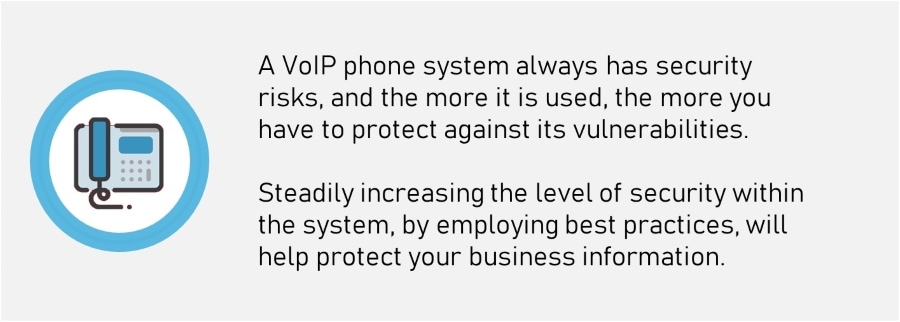
Securing your VoIP System
Like any internet-connected device, VoIP phones can be the target of cyber criminals involved in theft, fraud, and other malicious activities, with illicit calls and eavesdropping topping the list.
Fortunately, you can take concrete steps to significantly minimize the liklihood of VoIP fraud incidents and secure your VoIP deployment with just a few simple steps.
Securing critical settings on your business phone system, including VoIP devices and routers, will help prevent malicious attempts saving your organization time, money, and resources.

